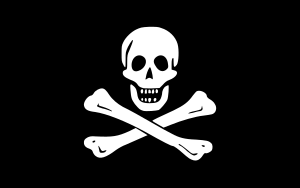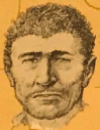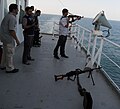Portal:Piracy
Introduction

Piracy is an act of robbery or criminal violence by ship or boat-borne attackers upon another ship or a coastal area, typically with the goal of stealing cargo and other valuable goods. Those who conduct acts of piracy are called pirates, and vessels used for piracy are called pirate ships. The earliest documented instances of piracy were in the 14th century BC, when the Sea Peoples, a group of ocean raiders, attacked the ships of the Aegean and Mediterranean civilisations. Narrow channels which funnel shipping into predictable routes have long created opportunities for piracy, as well as for privateering and commerce raiding.
Historic examples of such areas include the waters of Gibraltar, the Strait of Malacca, Madagascar, the Gulf of Aden, and the English Channel, whose geographic structures facilitated pirate attacks. The term piracy generally refers to maritime piracy, although the term has been generalized to refer to acts committed on land, in the air, on computer networks, and (in science fiction) outer space. Piracy usually excludes crimes committed by the perpetrator on their own vessel (e.g. theft), as well as privateering, which implies authorization by a state government.
Piracy or pirating is the name of a specific crime under customary international law and also the name of a number of crimes under the municipal law of a number of states. In the 21st century, seaborne piracy against transport vessels remains a significant issue, with estimated worldwide losses of US$25 billion in 2023, increased from US$16 billion per year in 2004. (Full article...)
Selected biography -
Micajah "Big" Harpe, born Joshua Harper (before 1768 – August 24, 1799), and Wiley "Little" Harpe, born William Harper (before 1770 – February 8, 1804), were American murderers, highwaymen and river pirates who operated in Tennessee, Kentucky, Illinois and Mississippi in the late 18th century. They are often considered the earliest documented serial killers in United States history.
Loyal to the British Crown during the American Revolution, the Harpes became outlaws after the war and began robbing and killing settlers in the remote frontier west of the Appalachian Mountains. They are believed to have killed 39 people, and possibly as many as 50. As the Harpes' crimes gained notoriety, vigilante groups formed to avenge their victims, and they were eventually tracked down and executed around the turn of the century. Their savagery has since entered American folklore, appearing to have been motivated more by blood lust than financial gain. (Full article...)Selected article -

Did you know?
- ... that since 1904 the Gasparilla Pirate Festival in Tampa, Florida, has featured a pirate-themed parade?
- ... that indigenous Australian artist Daniel Boyd has depicted colonial figures including Captain James Cook and Governor Arthur Phillip as pirates?
- ... that Saudi Arabian broadcaster beoutQ pirated and resold beIN Sports programmes during the Qatar diplomatic crisis?
- ... that the developers of Hotline Miami 2: Wrong Number suggested that Australian customers pirate their game?
- ... that HMS Redpole, one of the aptly-named coffin brigs, sank in an action with a pirate vessel in August 1828?
- ... that in the Golden Age of Piracy, the word "pirate" was often spelled "pyrate" or "pyrat"?
- ... that English pirate Henry Every, who was sometimes known as Long Ben, was one of the few major pirate captains to retire with his loot without being arrested or killed in battle?
- ... that, while it is unknown if pirates actually kept parrots as pets, it is thought that at least some captains kept cats aboard to keep populations of rats and other vermin down?
Selected quotations
| “ | Come, let us make a hell of our own, and try how long we can bear it. | ” |
| — Blackbeard | ||
General images
Selected Jolly Roger

Subcategories
Topics
WikiProjects
Related portals
Things you can do

Contribute
- Work on piracy and pirate articles and help improve them to featured articles.
Expand
Join
WikiProject Piracy Requests
- eliminate red links from List of pirates
- expand Timeline of piracy, specifically to fill in vast gap between the 1890s to 2000s
- revise Bartholomew Roberts
- help with Requested articles and Expand articles
- help with Portal:Piracy
- Create Modern Piracy
Associated Wikimedia
The following Wikimedia Foundation sister projects provide more on this subject:
-
Commons
Free media repository -
Wikibooks
Free textbooks and manuals -
Wikidata
Free knowledge base -
Wikinews
Free-content news -
Wikiquote
Collection of quotations -
Wikisource
Free-content library -
Wikiversity
Free learning tools -
Wiktionary
Dictionary and thesaurus










































































































